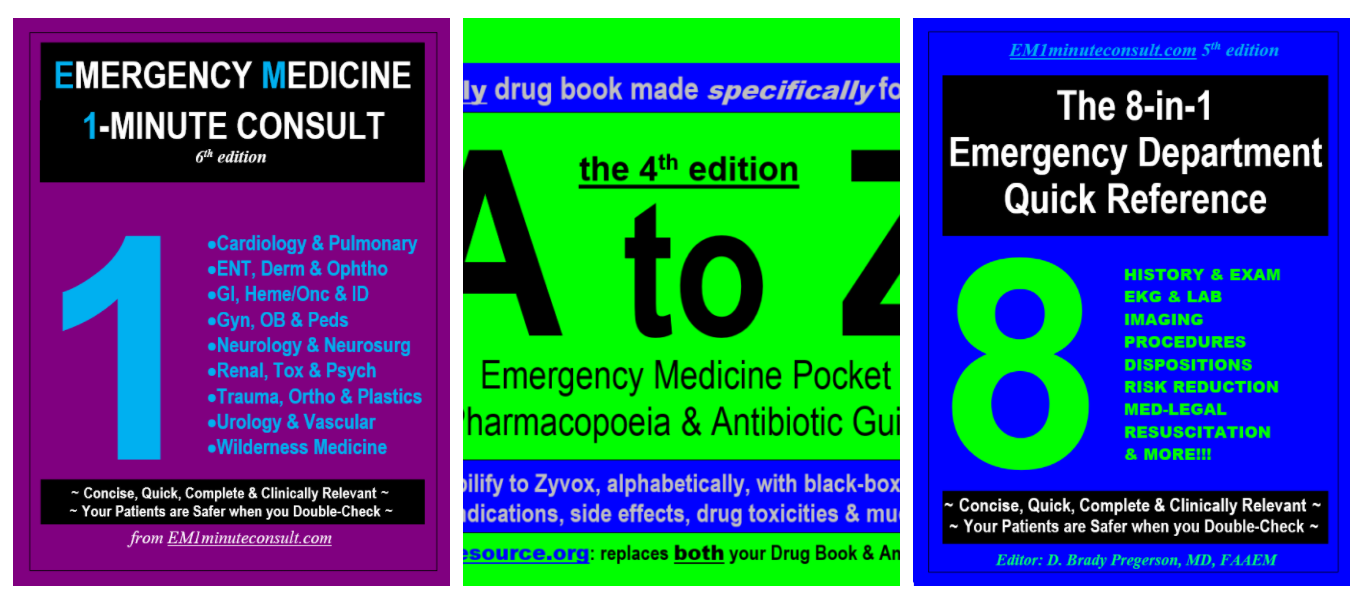History of Present Illness: A man in his mid 60’s presents to the ED with two weeks of exertional chest pain and SOB. Episodes last about 5 minutes and are relieved by rest. He has a history of HTN but denies any other medical problems. He does not smoke or drink. He saw his doctor recently and had blood work done. The hemoglobin came back low at 8 so he was sent to the ER. He denies melena or a history of anemia.
Vital Signs & Physical Exam: Vital signs are all completely normal. Physical exam is normal including a guaiac test
Initial Diagnostic Testing:
- CBC: WBC 6, Hb 8.3 with macrocytosis, Plt 100
- EKG and Troponin-i: normal
- Chem: normal including LFT’s
- Imaging: CXR
What is the most likely cause of the anemia?
- A) Intermittent GI bleed
- B) Alcoholism
- C) Malignancy
- D) Thalassemia
SCROLL DOWN FOR ANSWERS & 1-MINUTE CONSULT
<<<<<<<<<<<<<<<<<<<<< ADVERTISEMENT & SPACER >>>>>>>>>>>>>>>>>>>>>
THE EMERGENCY MEDICINE POCKETBOOK TRIFECTA

Emergency Medicine 1-Minute Consult, 5th edition
A-to-Z EM Pharmacopoeia & Antibiotic Guide, NEW 5th edition
8-in-1 Emergency Department Quick Reference, 5th edition
******************************************************************************
<<<<<<<<<<<<<<<<<<<<<<<<< END SPACER >>>>>>>>>>>>>>>>>>>>>>>>>
ANSWERS: What is the most likely cause of the pain?
- A) Intermittent GI bleed
- B) Alcoholism
- C) Malignancy
- D) Thalassemia
1-Minute Consult on this topic:
MACROCYTIC w/ HYPER-SEGMENTED NEUTROPHILS
- Folate: Diseases: liver disease, hemolysis Diet/Meds: EtOH/malnutrition, meds (HIV & cancer meds)
- B12: Diseases: IBD, tapeworm, bowel resection, gastric bypass Diet/Meds: vegetarian/vegan, metformin, PPI or H2 blocker, Dilantin
- PA: Pernicious Anemia: numb, glossitis, cord: posterior columns
MACROCYTIC w/o HYPER-SEGMENTED NEUTROPHILS
- Marrow: Marrow Failure: aplastic, myelodysplasia, leukemia, chemo,
- Other: Thyroid, HIV meds, alcohol
CASE CONCLUSION: Got a call from the lab that there were immature WBC’s and Auer rods present consistent with aggressive myelodysplastic syndrome
